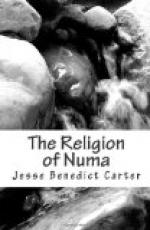The central feature of the religion of the empire was a thing altogether unique and unknown in the republic: the worship of the emperors as gods. From Augustus on this was the chief characteristic of the state religion; its beginnings must be sought therefore under his reign and he is largely accountable for it. According to our modern ideas it seems a very strange thing to worship a living man as a god; it seems also strange to worship a dead man as a god, but there we have at least the analogy of the worship of the saints, and the inherent instinct of the race toward ancestor-worship which unexpectedly crops out in all of us at intervals. But we must rid ourselves of modern ideas and try to appreciate the historical evolution of emperor-worship. This evolution is perfectly clear and we can trace every step of it, though in doing so we must remember that the various processes which we are compelled to take up one after another in our explanation went on in nature side by side, and exercised a sympathetic influence one upon the other, which we have to eliminate from our explanation but make allowance for in our finished concept.
We have seen that from the very beginning of religious life in Rome the idea was present that everything, each individual and each family, had its divine double, the individual in the shape of his Genius, the family in the shape of protecting spirits, Vesta, the Penates, and later the Lar. In addition to this, under the influence of the Greek myths which various families adopted, certain gods originally independent became especially associated with these families. Each family was naturally interested in the worship of its own gods, but this particular worship was quite as naturally confined to the particular family or its dependents. Now the first preliminary step toward emperor-worship was taken when the gods of the imperial family began to be worshipped by other families, then by all other families, and officially by the state. But from the very beginning the gods of each family had included also the deified ancestors, the Di Manes, at first thought of en masse and not as individuals, but toward the close of the republic




